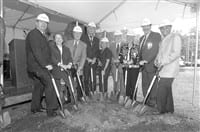Meeting A Need New Dialysis Center At Wing Provides Convenience To Palmer-area Patients
Two decades ago, Fresenius Medical Care operated one dialysis center in the Pioneer Valley, at a location in East Springfield. Today, there are eight, scattered across Western Mass. and Northern Conn.
The company’s rapid rate of expansion mirrors the growth of area suburbs and speaks volumes about the graying of society. It also illustrates how Fresenius has worked to identify opportunities to bring needed services — and greater convenience — to residents of more remote areas.
All these factors were motivators in the creation of the company’s latest facility — the Palmer Dialysis Center, which recently set up shop on the campus of Wing Memorial Hospital. Situated roughly half-way between Springfield and Worcester, the Palmer area, or the Quabog Valley, as it’s known, has historically been underserved with regard to dialysis treatment, said Allen Struthers, area administrator for Fresenius.
He told The Healthcare News that the Palmer facility, while presenting the company with another growth opportunity, also eases the burden of Palmer-area residents, who had been saddled with nearly hour-long trips to receive dialysis treatments.
“Fresenius tries to go into communities where there is a recognized need,” he said. “Demographics tell us where the need is. Transportation for this area was an issue, and the further out you go, the worse it is.”
Dr. David Poppel, whose firm, Western New England Renal and Transplant Associates of Springfield, was a key mover in getting the center built, said grass-roots demand for the service has been growing ever since.
“We first started looking into the possibility of bringing a dialysis center to this area about five years ago because patients were asking for it,” he explained. “About three years ago, the cry became louder.”
Because of his company’s strong relationship with Fresenius, the latter was an obvious choice to talk to first. “We told them the community wants this, and we lobbied hard to show Fresenius it would be feasible,” Poppel recalled. “Their marketing studies agreed.”
Once word got out, he said, “people quickly began asking, ‘when is it going to open?’” Poppel also pointed out that Palmer’s location, off exit 8 of the Turnpike, makes such a center attractive to people who were previously forced to travel to Worcester for treatment.
The need for a dialysis center at the eastern fringes of Western Mass. is clear when one understands the entire process. First, there is the ride to the center. From the Palmer area, the nearest center had been a 40-minute ride to East Springfield, where Fresenius operates another center. The process itself is four to four and a half hours long.
As Struthers told The Healthcare News, that process just got a little easier for patients who live between Springfield and Worcester.
A Six-hour Day
Jonathon Slater, a nephrologist with Pioneer Valley Nephrology, with offices in Springfield, Holyoke, and Palmer, said dialysis treatment is a long, often grueling ordeal made more difficult by the fact that patients cannot drive themselves to and from treatment. For Quabog Valley residents who had to drive to Springfield or Worcester for treatment, the burden was especially heavy.
“It added up to about a six-hour day; multiply that by three times a week, since dialysis must be done that often, and one gets some idea of the inconvenience,” said Slater, adding that the burden was so great some patients wound up skipping treatments, essentially putting their lives in danger.
The Palmer Dialysis Center, which opened on Feb. 3, will make coping with dialysis somewhat easier, said Jean Dowd, R.N., director of nursing at the facility as well as its day-to-day director. She told The Healthcare News that the facility, with 13 chairs, has the capacity to treat 72 patients each week. It is currently seeing about half that total, but expects volume to increase when snowbirds return from Florida and other warmer climes later this spring.
Beyond the convenince factor, Dowd said there are other advantages to being located on the Wing campus. Like any medical procedure, there are risks involved with dialysis, she explained. Emergencies are rare, but they do occasionally occur. Such emergencies may include hypotension (low blood pressure), extensive post-treatment bleeding, abnormal heart rhythms, or even heart attack. When that happens, medical help is just minutes away. Many problems that require treatment are not directly related to the procedure, such as infection, she said, but do need to be addressed by physicians.
“I think that having the hospital right next door is very reassuring to the patients,” Slater said. “The paramedics can be there quickly. A defective shunt can be fixed in a timely manner. It’s a tremendous incentive for patients. In addition, Wing is a smaller hospital, and I think that makes it a more user-friendly environment.”
Struthers agreed. “Fresenius felt it was the right time to partner with Wing Memorial,” he said. “It’s good for both of us. One of our biggest advantages to the community is also our relationship with Wing. Patients who are admitted to the hospital here for other reasons, but who also have renal failure, don’t have to be transferred to another hospital, as was the case before. For instance, patients who might have pneumonia and are admitted to the hospital can also receive their dialysis here. That’s a big advantage for everyone.”
Center of Attention
In Poppel’s view, all of the positives make the center a winning proposition. “We’re very happy with it,” he said. “A lot of people, especially at the hospital, worked very hard to get this done. There is camaraderie there among the nurses and technicians knowing that they are giving this care locally. It’s very satisfying to see how happy the patients are.”
For more information about the Palmer Dialysis Center, call (413) 284-0700.

